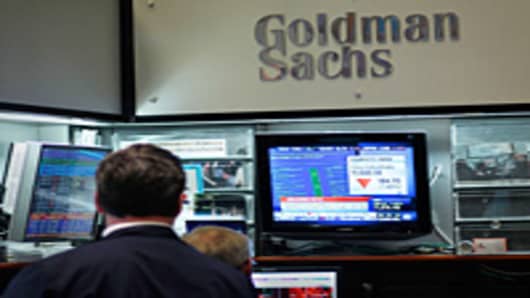We’ve been critical of Meredith Whitney on “The Strategy Session”—especially when it came to her bearish call on the municipal-bond market. But Tuesday she deserves credit for posing what may be the investment community’s biggest question to Goldman Sachs on the heels of its first-quarter earnings.
Goldman Tuesday morning reported revenues of nearly $12 billion and net earnings of $2.7 billion, beating analyst consensus estimates by a mile.
The firm’s historically killer fixed-income, currency and commodities business was up dramatically from the fourth quarter of last year, but down 28 percent from the same period in 2010—better than some analysts hoped, but a comparative disappointment.
During the firm’s hour-long investor callwith chief financial officer David Viniar, there was a lot of talk about Goldman clients: what they wanted and didn’t want, how cautious and risk-averse they had become, how their approach to areas like leverage and distressed investing was driving the firm’s business. The analysts listened politely as Viniar declined to address many of their questions in detail—that is, until Whitney was given her two minutes.
“It doesn’t sound like it’s in Goldman Sachs’s nature to wait for client volumes to come back,” said Whitney. “It feels structurally long-lived. So what happens over the next few quarters if we still have volumes like this?”
Viniar began with his standard-issue I-don’t-like-to-make-predictions disclaimer. Then he got to the meat of the matter—sort of: “If volumes continue to stay where they are or get slower and we think they’re going to stay that way, then we’re going to have to make some changes whether to capital, to head count, or to other expense items.”
Fair enough—so they’ll make changes as needed if volume continues to be tepid. But, client matters aside, the firm is still making good money in what was once called its proprietary-trading business (before the Volcker Rule was immortalized as part of the Dodd-Frank Act last summer).
As my colleague John Carney pointed out in his excellent post this morning, Goldman’s investing and lending business—which is the trading and principal—investment business that is separate from the FICC and the other market-making activities—had impressive net revenues of $2.7 billion for the quarter.
That was 36 percent more than the fourth quarter, and 37 percent more than the same period last year. So even if client volume continues to be middling, the firm might make out just fine.
Follow Kate on Twitter: @katekellycnbc
Watch Kate Kelly weekdays at Noon ET on CNBC's "The Strategy Session."
Questions? Comments? Write to kellycomments@cnbc.com



